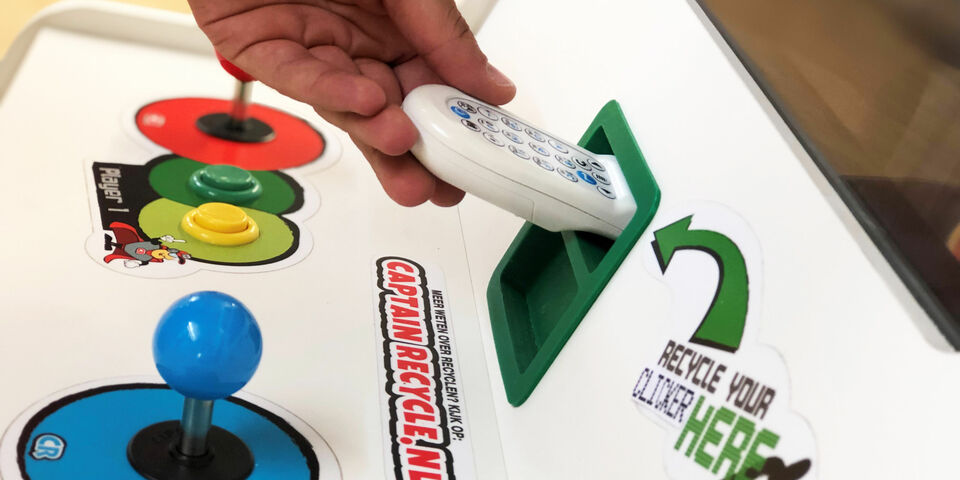Game over for 'clicker'
TU/e will stop using the current 'clickers' (response systems) for teaching purposes as of next academic year. The clickers have nearly reached the end of their life span and the manufacturer has made it known that they will no longer supply the devices. The university asks students to return the more than five thousand clickers still in circulation so that it can start looking for new uses for the devices.
Following a successful pilot at two departments, the clickers were put into service at the end of 2012 in order to promote interaction between teacher and students during lectures. In addition, and to a lesser extent, they were used for taking interim tests. But the use of the clickers has steadily declined in recent years, says notebook coordinator Peet van Leeuwen (Education and Student Affairs), who is involved with the farewell project in his capacity of advisor.
Initially, students had to pay for their own clicker, but since 2015, the devices were given to them on loan. Approximately eighteen hundred clickers were handed out last September; there are currently, since the start of the loan agreement, about five thousand devices still in circulation, Van Leeuwen says.
Not user friendly
At the beginning of this academic year, the manufacturer informed the university that it will no longer supply the clickers. Besides, Van Leeuwen says, the system is “somewhat outdated by now, difficult to maintain, and simply not very user friendly. There are so many other mobile apps and similar devices at this point, and many of them are much easier for both students and teachers.”
Instead of the clickers, TU/e will offer its students a wide variety of tools, such as Mentimeter and Canvas Quizzes-Next, in order to promote interaction during lectures and to take interim tests. The university will not opt for an exact substitution for the clicker, and students will not have to buy a new tool, Van Leeuwen says - the only thing they need is internet access to work with the abovementioned tools during lectures.
The university asks every student who is still in possession of a clicker to return it as of this week (at the desk or via a return box at IMS Services/Student in MetaForum, or at TU/e’s GO Green Office in Atlas). Students received an email about this, and there are reminders on several of the screens on campus as well.
TU/e hopes to have collected as many of the five thousand clickers as possible before summer holiday starts. They are completely worthless anyway now that the university has decided not to use them anymore, Van Leeuwen says, because TU/e clickers function only in combination with a specific receiver in the lecture halls. In addition, students who do not return the devices, the loan agreement states, will have to pay a fine of sixty euros. Students following an internship abroad are allowed to return the clickers at a later moment.
The university hopes to put the clickers to use in a meaningful way; one way, Van Leeuwen says, could be to donate them to a school where they could be used for a teaching program or converted for a different use. “But we are still looking into the possibilities.”
'Prullenbak Bullebak'
Do you want to say goodbye to your clicker in a cheerful way? You can do so at the GO Green Office in Atlas. This environmentally-conscious office uses the Funky Phone: a rented old-school game chest in which students can insert their clicker instead of a coin.
For each returned clicker, you get to play three games; there are four games in total (waste-related, such as Prullenbak Bullebak), says Bas Turk of GO Green Office. “This way, we want to give the return campaign a positive spin.”
The Funky Phone, as its name already indicates, is normally used to collect discarded mobile telephones, but a pre-test showed that the machine also detects clickers. Each TU/e clicker contains the name of a student, so that it is possible to check who returned his or her clicker afterwards, Turk emphasizes. “So, it doesn’t matter if you return your clicker here or to the people of ICT.”
Idea box
Next to the game chest, you’ll find an idea box. In it, students can drop ideas about what should be done with the clickers next. The GO Green Office also prefers a new use, Turk says. One option would be to convert the devices into presentation clickers. “If it turns out that this idea meets with a great deal of enthusiasm, the students who returned them could get the clickers back once the devices have been converted.” In case no new use should be found, the clickers will at least be recycled in an environmentally friendly manner,” Turk assures.
The return campaign for the clickers will last until Friday, July the 5th. You can find the Funky Phone in front of the GO Green Office on the ground floor of Atlas. Students are welcome here at any moment during the building’s opening hours.




Discussion